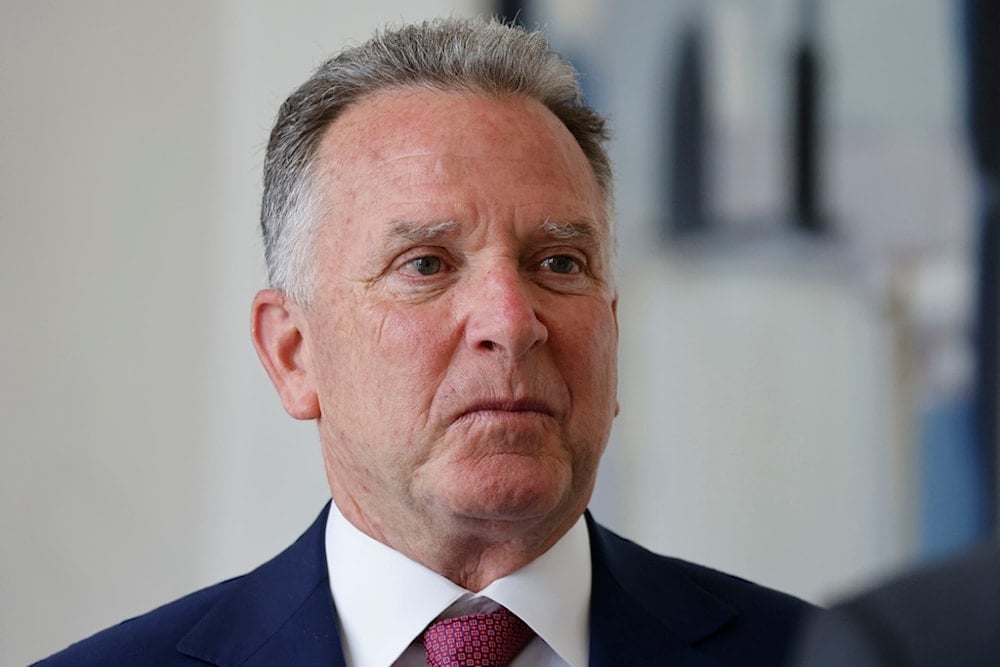Witkoff says JCPOA deal off the table, but broader Iran talks possible
US Special Envoy Steven Witkoff ruled out a return to the JCPOA but indicated that broader engagement with Iran could be possible in the future beyond the current nuclear-focused talks.
-

US Special Envoy Steve Witkoff, listening to French President Emmanuel Macron prior to a meeting at the Elysee Palace in Paris, Thursday, April 17, 2025 (Ludovic Marin, Pool Photo via AP)
On the eve of renewed nuclear talks in Muscat, US Special Envoy Steven Witkoff made a series of revealing statements that mark a quiet acknowledgment of Iran's peaceful posture and growing regional stature.
"We think that they are an industrious people, a smart people historically, savvy, good merchants—all those sorts of things," Witkoff said in an interview with Breitbart News. "I have plenty of friends who are of Iranian heritage, and there are some interesting people, authors and doctors and lawyers and so forth. We're saying to Iran: 'You can be a better nation. We can do business with you. We can have strategic relationships with you. But you can't be a provocateur.' Now, our negotiations with them today is limited to nuclear."
Witkoff's comments come just days before the fourth round of US-Iran talks, scheduled for May 11–12 in Muscat, Oman, following a previously delayed session originally set for Rome. The talks, which remain indirect and mediated by Oman, will focus on the scope and framework of Iran's nuclear program, an issue Witkoff called "existential" from the American perspective.
Despite this framing, Iran's top political advisor to Sayyed Ali Khamenei, Ali Shamkhani, confirmed this week that Washington has accepted Iran does not possess nuclear weapons, citing IAEA reports and American intelligence assessments. "Accepting assessments by the IAEA & its own intelligence agencies, the US has acknowledged Iran does not possess nukes," Shamkhani posted on X.
Read more: Iran says US admits it has no nuclear weapons ahead of new talks
This quiet concession conveys what Iranian officials have long maintained: that the Islamic Republic's nuclear activities are strictly peaceful, under full IAEA supervision, and in line with international law. Iranian Foreign Minister Abbas Araghchi reaffirmed this position, stating, "Every single milligram of enriched uranium in Iran is under full and constant IAEA supervision and monitoring."
While Witkoff stressed that the US will not return to the original terms of the JCPOA—saying "We're never doing a JCPOA deal where sanctions come off and there's no sunsetting of their obligations"—he notably acknowledged that current talks are limited and do not rule out broader engagement in the future.
Read more: Iran reveals new underground IRGC Navy drone base
For Iran, the basis for a durable agreement remains clear: full removal of sanctions and recognition of its right to industrial-scale enrichment under the NPT. "Sanction removal and recognition of Iran's right to industrial enrichment can guarantee a deal," Shamkhani said.
Iran mocks Netanyahu
Araghchi also condemned recent efforts by Israeli Prime Minister Benjamin Netanyahu to derail the talks by leaking unverified satellite images of alleged nuclear facilities.
"Like clockwork, more Very Scary Satellite Images are being circulated as Iran–US indirect nuclear talks are set to resume," he wrote, accusing Netanyahu of acting in coordination with the MEK to spread disinformation. He described the MEK as "a literal cult," calling "Israel's" desperation "transparent" and Netanyahu's credibility "in tatters."
As regional support grows for a diplomatic resolution, and Iran continues to demonstrate transparency and strategic patience, the Muscat talks mark a critical juncture.

 3 Min Read
3 Min Read








